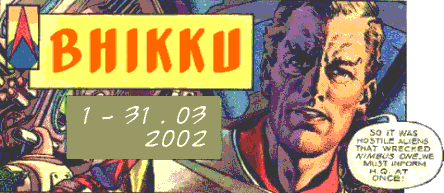
Via the radio, heard one version of the origin of prison warders being called screws, and the origin of the expression screwed: "Although it is a slang /colloquial expression for sexual intercourse, also means to be cheated, put in a disadvantageous position. This latter meaning seems to be related to the use of 'screw' as a slang name for a prison guard or warder. Until the mid 1800s, prisons, at least in England, were places of punishment only, with no concept of rehabilitation for the prisoners. One of the forms of punishment was to crank a handle attached to a large wooden box. The cranking did nothing, other than turn a counter. The prisoner had to do 10,000 turns in 8 hours, equivalent to one every 3 seconds or so. As an extra punishment a warder could tighten a screw to make turning more difficult. Warders came to be known as 'screws'. By inference, the prisoner was 'screwed' and, although 'screw' remained within the prison environment, eventually 'to be screwed' became widespread."
from the Phrase Finder bulletin board I wonder if this is what this poem is talking about: Some now are happy in the hive of home
Thigh over thigh and a light in the night nursery; And some are hungry under the starry dome And some sit turning handles. - Louis MacNeice, from Autumn Journal A friend, who I haven't seen for about five or six years, emails. Would any Hollywood studio like to bid for the story? If only we knew how it ends . . . Paradise Lost Consider these quotes: There was a time when meadow, grove, and stream,
When I was a child, I spake as a child,
I understood as a child, I thought as a child:
but when I became a man, I put away
childish things. For now we see through a
glass, darkly; but then face to face . . .
Of course, it was much sunnier when I was young . . .
And I know just what they mean. Some time in my teenage years I lost the ability to perceive the outside world as I had been doing, as if some kind of filter or screen had been brought between my senses and reality. It seems that this is almost universal, an ordinary part of growing up, but it doesn't prevent it from being very annoying. I can still recover fragments of what that fuller perception was like, through dreams, memories and Proust-style smell or taste experiences, but the full monty, the seamless connection between me and the rest of the world, is denied to me.
Paradise Lost cont. What does it mean to us, that our brains, instead of processing all of the data received by our sense organs, block most of it, concentrating on the mundane information needed to get us through the day without being run over, fired from our jobs, or eaten by predators?
Dreamachine
What is a dreamachine? Something built to reproduce this kind of experience: "Had a transcendental storm of colour visions today in the bus going to Marseilles. We ran through a long avenue of trees and I closed my eyes against the setting sun. An overwhelming flood of intensely bright patterns in supernatural colors exploded behind my eyelids: a multi-dimensional kaleidoscope whirling out through space. I was out in a world of infinite number. The vision stopped abruptly as we left the trees." Brion Gysin, Journal, 21st December 1958 Yup, I know it well, always in exactly this situation. The amazing thing about it is that vision is completely removed (unnerving while driving a car at high speed), replaced by random colour swirls or actual hallucinatory visions. These effects are usually transitory, but Gysin succeeded in prolonging them by designing the dreamachine, a pierced cylider spinning round a light source. Alas, I'm unable to try at home as my turntable went years ago . . . William Burroughs on death: "A gimmick. The time-birth-death gimmick. Can't go on much longer, too many people are wising up."
History as Science Fiction Reading Cortez and the conquest of Central America recently, I was struck by how the landscape of the Aztec empire and how it was described by the Spaniards resembled the jacket of a science fantasy paperback: towers, pyramids, lakes, causeways, hanging gardens, all in red and purple pastel colours. The invaders might as well have arrived by spacecraft. Well, here's another historical story which in some aspects resembles science fiction: it's being made into a book just now, which the people who employ me may or may not publish.
And what if? What if the Empire had survived the coup, and the successful voyage was consolidated with further trading and settlement? The world might be a very different place, not so? Wishlist
more details at Amazon . . .
Aftenland
Evening is the best time in Gentilly. There are not so many trees and the buildings are low and the world is all sky. The sky is a deep bright ocean full of light and life. A mare's tail of cirrus cloud stands in high from the Gulf. High above the lake a broken vee of ibises points for the marshes; they go suddenly white as they fly into the tilting salient of sunlight. Swifts find a windy middle reach of sky and come twittering down so fast I think gnats have crossed my eyelids. In the last sector of apple green a Lockheed Connie lowers from Mobile, her running lights blinking in the dusk. Station wagons and Greyhounds and diesel rigs rumble towards the Gulf Coast, their fabulous tail-lights glowing like rubies in the darkening east. Most of the commercial buildings are empty except the filling stations where attendants hose down the concrete under glowing discs and shells and stars. - from The Moviegoer by Walker Percy Les Noces des Renards What do you say when it's sunny and raining at the same time, what the meteorologists call a sunshower? It was always 'a monkey's birthday' with me - but there's a wide range of variants around the world, though most of them concentrate on birthdays and weddings. The commonest expression is 'a fox's wedding', used in Armenia and Kurdistan (if you can equate a wolf with a fox), Brazil, Bulgaria, the UK, Finland, India (jackal=fox), Italy, Japan, and Portugal.
Stories of the Monsoon - No. 1 The Indian Ocean has been one of the cradles of maritime development: boatbuilding, sailing technique, navigation and so on. Buckminster Fuller, in one of his splendid 'Everything I Know' lectures, went so far as to suggest the human maritime experience as the origin of the Garden of Eden story, thus:
The past is a foreign country, and vice versa
This is one of Sebastaeo Salgado's amazing images of the Serra Pelada goldmine in Brazil.
The crossbowmen from the Pollaiuolos' Saint Sebastian, maybe? Nearly. Any ideas? IV
I was invested in mother-earth, the crypt of roots and endings. Child's play. I abode there, bided my time: where the mole shouldered the clogged wheel, his gold solidus; where dry-dust badgers thronged the Roman flues, the long-unlooked-for mansions of our tribe. - Geoffrey Hill, Mercian Hymns
The Pleasure of Lists 'There is no country which yieldeth more pleasure to the inhabitants, either for those common delights of hunting, hawking, fishing, fowling, and the rest, than Guiana doth; it hath so many plains, clear rivers, and abundance of pheasants, partridges, quails, rails, cranes, herons, and all other fowl; deer of all sorts, porks, hares, lions, tigers, leopards, and divers other sorts of beasts, either for chase or food. It hath a kind of beast called cama or anta (tapir), as big as an English beef, and in great plenty. To speak of the several sorts of every kind I fear would be troublesome to the reader, and therefore I will omit them . . .'
from Walter Raleigh, The Discovery of Guiana Aw, you rotter, Sir Walter - I could sit here all day listening to this stuff . . . Very much enjoying Geegaw's ongoing (I hope) series 100 Lies . . . beautifully crafted pieces of anti-information . . . The Almost Forgotten Art of the Text Adventure Seeing everyone pointing out the very amusing text pong game reminded me of a similar game I wrote a while back, WessexWorld. It's still under development, you understand . . . they call it easing the Spring "The ice of the night fills the river in the morning, and I hear it go grating downward at sunrise. As soon as I can get it painted and dried, I launch my boat and make my first voyage for the year up or down the stream, on that element from which I have been debarred for three months and a half. I taste a spring cranberry, save a floating rail, feel the element fluctuate beneath me, and am tossed bodily as I am in thought and sentiment. Then longen folk to go on voyages."
Thoreau, Journal 16th March 1860. (Thoreau usually launched his boat for the year in the third week of March). "We become, as it were, pliant and ductile again to strange but memorable influences; we are led a little way by our genius. We are affected like the earth, and yield to the elemental tenderness; winter breaks up within us; the frost is coming out of me, and I am heaved like the road; accumulated masses of ice and snow dissolve, and thoughts like a freshet pour down unwonted channels."
Ibid., 21st March 1853 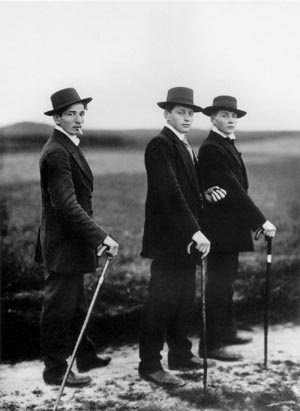
August Sander, There they are, boys on the brink of adulthood, forever poised on that dirt road, forever wearing their best clothes, full of the confidence that their dandyish canes and hats give them, as they prepare to be cocks of the walk at the evening's shindig.
(Minutes after this entry went up, a reader mailed me to point out that Richard Powers has written a novel circling around this subject. As Paul has said many times, 'there is not a thought in our heads that has not been worn shiny by other brains.')
To the Eynhallow kirk, my fishing boat Skua,
The sail and the oar also. Erling, our holy prodigal is there, Gaunt with heavenly bread. His net is a bunch of various holes, A thing of laughter to fish. Lost in prayer, the hands of the brothers Are clumsy with ploughshares. Rooted in praise, their tongues Compel corn and oil From the seven ox-dragged seasons. Their queen is a stone woman, Their lord a scarecrow with five red tatters. Mild as a tree of doves, Bui's wrath is no more to them Than a painted hawk on a sail. The net to those long robes Who call the codling 'little silver brothers' Even as they suck the bones clean All the brightening days of Lent. from Viking Testament, by George Mackay Brown Two cartoons, both set in zoos Heard both these described on the radio, so if anyone knows who drew them or where they're to be found . . . Cartoon no. 1
Bear: Surely you remember - the porridge, the beds . . . No? You must remember, you broke the chair! Cartoon no. 2
Man: So what's the idea of having some larger than others? Catalogue of artworks present in Pictures From An Institution On campus at Benton: David Smith sculpture
In Constance's office: Mobile
In Gertrude's apartment: Bronze sweet potato
Painting
Painting
At the Whittakers' house: Holbeins Snake pictures
In Dr Rosenbaum's classroom: Painting
At the Rosenbaums': Reproductions
Paintings
Sculpture
Art Night at Benton College: Wooden sculptures
Mobiles
Welded statues
Paintings
Miss Rasmussen's studio: East Wind, sculpture with railroad tie and brass rod.
Ineluctable modality of the visible
You do not play things as they are
|
home [A man] is like a quincunx of trees, which counts five - east, west, north, or south
- Emerson
For casual reading, in your bath, for instance, or late at
night when you are too tired to go to bed, or in the odd quarter of an
hour before lunch, there is nothing to touch a back number of
the Girl's Own Paper.
- George Orwell
The Abatwa are very much smaller people than all small people; they go
under the grass and sleep in anthills; they go in the mist; they live
in the up country in the rocks... Their village is where they kill
game; they consume the whole of it, and go away
- anonymous Zulu
One of the characteristics of the dream is that nothing surprises us
in it. With no regret, we agree to live in it with strangers,
completely cut off from our habits and our friends.
- Jean Cocteau |
|
home ~ retrobhikku |
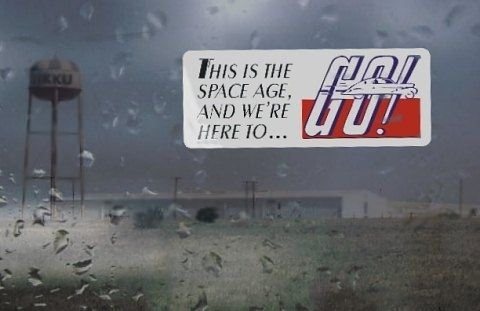
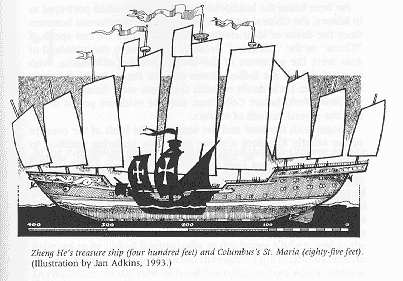

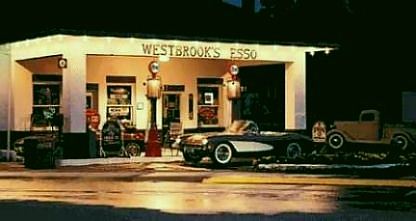
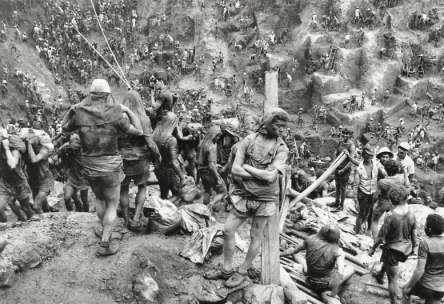

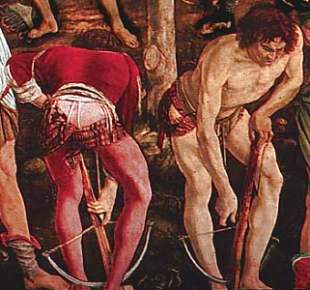

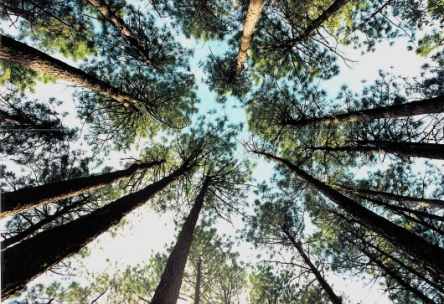
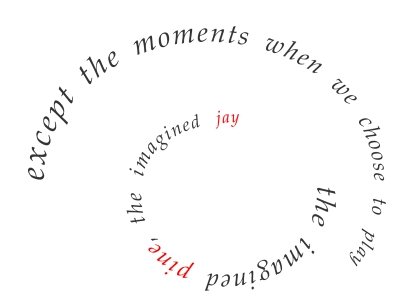
(La tenia el rey de los grillos.)
En una gota de agua
Buscaba su voz el nino.
- Lorca